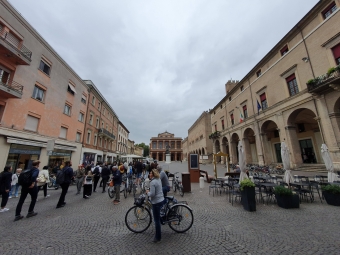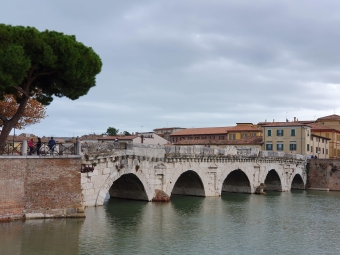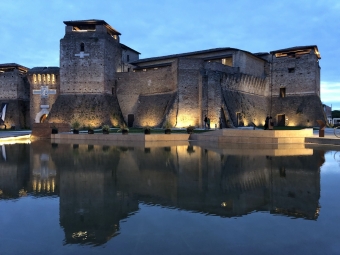In October, our team travelled to the partner city of Rimini. This Italian town is located on the Adriatic coast in the Emilia-Romagna region and is recognised as one of the most popular seaside destinations in Europe. And with tourism accounting for 14% percent of all business, there is a need for an overall modernisation of the town itself, the management and the services offered.
The city of Písek has joined the European project Re-Value, which focuses on sustainable municipal development leading to climate neutrality. Alesund, Bruges, Rimini, Cascais, Constanta, Izmir and Písek are the nine European cities cooperating in this project. Rimini is actively pursuing climate neutrality and resilience as part of the project. Their flagship project is called Parco del Mare, which translates as marine park. The Parco del Mare mitigates the impact of climate change through, for example, a plan for the protection of sea water, the modernisation of the sewage system or through urban regeneration projects involving 300 hectares of urban park, open-air gyms, cycle paths and many others). The main objectives Rimini wants to achieve in the project are the development of green and blue infrastructure, the development of environmental monitoring systems and the organisation of educational programmes.
In contrast, the Re-Value project in Písek seeks to follow the principles of the "New European Bauhaus" concept, which aims for sustainability and inclusion in the design and transformation of urban spaces. The intention of Písek is to involve citizens in the process of urban development and at the same time to strengthen the connection between urban space, inhabitants and the river. Our project partners are Ecoten, a company that specializes in the scientific foundations and techniques of urban development, and Maltings Písek.
The visit to Rimini lasted for 3 days and the program was really rich, from various lectures, discussions and workshops to a tour of the city itself. Rimini is trying to expand walking and cycling paths, looking for green infrastructure projects and striving to be as environmentally friendly as possible. There is also a participatory city budget in which citizens can get involved. The local authority works closely with local communities and together they strive to improve the city. During the various presentations, it was discussed, for example, how the municipality can create attractive conditions for private investment or enable public and private entities to work more closely together on common city goals. This was one of the main themes, as the Parco del Mare was only implemented with public funds. However, we also touched on topics regarding climate-neutral urban redevelopment, promoting multi-sectoral cooperation within the municipality, and dealing with the "silo mentality" within public administration. The decommissioning of obsolete industrial infrastructure is also one of the most important tasks to be accomplished.
In Rimini, there are still many opportunities to improve the city: a new strategic vision, new public functions, better access to public funding, a more strategic approach to urban regeneration or the ability to analyse the city's needs. But these are the challenges currently facing the whole of Italy and Rimini has become a pioneer in innovation.

Parco del Mare

Piazza Cavour is a beautiful square in the centre of Rimini, surrounded by historic buildings and shops.

The Tiberius Bridge is the most visited and oldest historical monument in Rimini. At 70 metres long with five Doric arches, it spans the Marecchia River and still serves its purpose today.

Malatesta Fortress, where various cultural and social events are held.

Project partners from Norway, Belgium, Bulgaria, Italy, Portugal, Romania, Turkey, Czech Republic and Croatia.